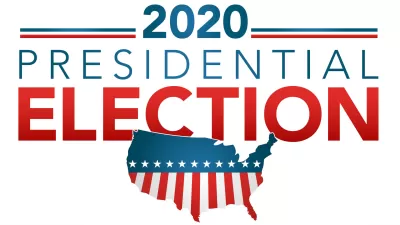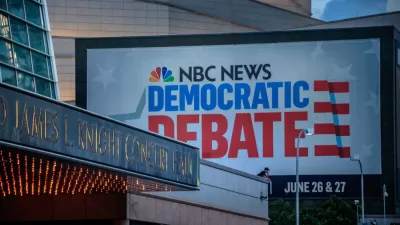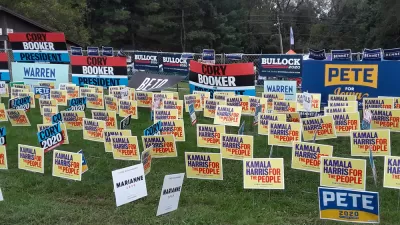The Democratic Party will hold a two-day debate event, starting tonight. It's time to brush up on the positions of the leading candidates on policies and politics relate to housing, climate change, and infrastructure.

Perhaps it's a symptom of the Democratic Party being in the position of challenging a Republican incumbent, but compared the 2016 presidential campaign, the 2020 campaign has noticeably shifted the national political discussion to matters of the built and natural environments.
No campaign talking point distinguishes this election cycle more than the prominence of the housing crisis in the policy proposals and media coverage generated by the Democrats.
High housing costs, evictions, and homelessness are weighing on the country, despite improving employment and the exuberant claims of the Trump administration about the strength of the economy. As a result, multiple Democratic candidates are pushing ambitious, and potentially expensive, proposals for fixing the housing affordability crisis.
Compare that to the previous campaign, when housing affordability had already reached crisis level, but the final two candidates for president conspicuously avoided the topic of housing and made only vague gestures toward the subject on the campaign trail. The most substantive housing policy proposal originated from the Democratic candidate for vice president, U.S. Senator Tim Kaine (D-Virginia). Even when confronted with questions about housing at the first of three debates, the two presidential candidates circumnavigated substance.
Immediately after Donald Trump's election, however, the consequences of the election for cities, infrastructure, the environment, and social justice became clear—in fact, the seeds of President Trump's administration had been obvious throughout the campaign. Trump promised to overturn environmental regulations and shrink the size of federal lands. Trump also demonized inner cities. The administration's efforts repeal the tenets of fair housing protections, add a citizenship question to the U.S. Census, and rescind environmental regulations were all foretold.
It was still a surprise when the secretary of the U.S. Department of Housing and Urban Development (HUD) in the Trump administration turned out to be a YIMBY (i.e., Yes In My Back Yard, a term to describe pro-development forces), or a when a Republican in the U.S. Senate introduced legislation called the "Yes In My Back Yard Act," or when President Trump signed an executive order to create the "White House Council on Eliminating Barriers to Affordable Housing Development." It will be up to more willingly opinionated pundits to consider whether Trump's recent pro-development gestures are designed for a campaign that must appeal to voters in swing states that might still be suffering in the current housing market.
In the context set by the housing market and the Trump administration's policies, only four of the 20 Democratic candidates for president who will take the stage at this week's debates have published a thorough, specific policy proposal intended to address the ongoing housing affordability crisis in the United States. (That number doesn't include candidates who have proposed or implemented housing plans affecting local or state constituents in current or previous offices.)
If that seems like a small number, it could be because the housing crisis is still having an impact on the campaign commensurate with the importance of the housing market to voters. Diane Yentel, president and CEO of the National Low Income Housing Coalition, agrees that the chatter about housing at this point in the campaign is unprecedented, recently telling NPR: "We've seen candidates talking more about the crisis and the solutions than we have I think in entire presidential campaigns in history."
Political Risk
The focus on the housing crisis might imply too much confidence that a chosen policy direction is a slam-dunk for any of these candidates—ideas that might have served the basis for an ideological litmus test in previous campaigns are now highly contested.
Kriston Capps recently wrote on the schism in the Democratic party regarding housing policy. On one side of the issue are candidates and other famous Democrats pushing for development incentives and a lot of funding and subsidies for housing construction. On the other hand are leading party figures like Congressmember Alexandria Ocasio-Cortez (D-New York), who opposes development out of concern for gentrification and displacement.
Then there are NIMBYs, many of whom vote Democrat. What will happen when homeowners, hyper-focused on preserving neighborhood character, hear a Democratic candidate for president talking about loosening local control in favor of more development and the end of single-family zoning? Noah Smith examines the implications of these conflicts in an article written for Bloomberg in June 2019.
Add to that dynamic the Republican Party, including the Trump administration, adopting the views of a run-of-the-mill YIMBY, and it's clear that this housing crisis makes for some strange bedfellows. Voters on either side of the political aisle are bound to encounter personal conflict on the issues.
Housing Proposals and News Coverage
Proposals
- My Housing Plan for America (Team Warren via Medium)
- Cory’s Plan To Provide Safe, Affordable Housing For All Americans (Cory Booker via Medium)
- People First Housing (Julián Castro)
- Harris Reintroduces Legislation to Provide Relief to Americans Facing Skyrocketing Cost of Rent (Kamala D. Harris: U.S. Senator for California)
News
- Julián Castro rolls out first part of housing reform platform (The Hill)
- Cory Booker and Kamala Harris’s affordable housing plans, explained (Vox)
- Sen. Cory Booker proposes capping rent paid by Americans at 30 percent of their income (The Washington Post)
- Cory Booker’s Housing Plan Offers Tax Credit to Millions of Renters (The New York Times)
- Cory Booker Wants to Pay Your Rent (The Wall Street Journal)
- Why Cory Booker Is Focusing on Affordable Housing (CityLab)
- Booker proposes capping rent paid by Americans at 30 percent of their income (The Washington Post)
- Elizabeth Warren’s Housing Crisis Plan Hints at Reparations (CityLab)
- RGJ exclusive: Sen. Elizabeth Warren on how her plan will fix Nevada housing crisis (Reno Gzette Journal)
- Kamala Harris revives tax credit push to help people pay for housing costs (Roll Call)
- Here’s how presidential candidates want to help solve the housing crisis (The Mercury News)
- 5 anti-poverty plans from 2020 Democratic presidential contenders, explained (Vox)
- Addressing the Affordable Housing Crisis (Moody's Analytics via Elizabeth Warren)
- How Bill de Blasio’s housing record stacks up to his ‘working people’ platform (Curbed New York)
- Kamala Harris: I'll help low-income Iowans afford their rent (Des Moines Register)
- Make America Affordable Again (Bloomberg Opinion)
- Gillibrand introduces bill blocking HUD rule on undocumented public housing residents (The Hill)
- Bennet Unveils Plan to Tackle Eviction Crisis (Michael Bennet: U.S. Senator for Colorado)
- Presidential hopeful Eric Swalwell on gun safety, housing, and impeachment (KCRW)
Climate Change
The housing crisis isn't the only existential threat facing voters. Don't forget climate change, a subject of obvious and essential relevance to many voters, not just planning related professionals and academics. The Democratic candidates for president have noticed, even if climate change hasn't proven to be an effective political strategy for Democrats on the federal level yet. By this count, climate change is the topic of planning relevance most likely to appear on the campaign platform of a Democratic candidate for president in 2019.
Compared to the four candidates who created official policies focused on housing, 11 of the 20 Democratic candidates have posted specific policy proposals regarding climate change on their campaign websites (ten are listed here, but you'll have to dig a bit on Pete Buttigieg's website to find that proposal).
In the media, Jay Inslee, Beto O'Rourke, and Joe Biden appear to be leading the discussion on climate change, so far, among the candidates. Inslee has centered climate change as the primary focus of his campaign.
Some of the momentum behind climate change as a key plank in presidential campaign platforms could be the result of simply heading the warnings of reports from the United Nations, the Department of Defense, and the U.S. Environmental Protection Agency about the consequences of failing to reduce carbon emissions from the world's economies. Or it could be growing concern over extreme weather, rising seas, or record-breaking wildfires. Or it could be simple political calculus in response to the decision by President Trump to exit the Paris Climate Agreement and rollback the Obama era Clean Power Plan.
Proposals
- Taking on Our Biggest Threat: Climate Change (Beto O'Rourke)
- Combat Climate Change and Pass a Green New Deal (Bernie Sanders)
- America's Climate Mission (Jay Inslee)
- John Delaney's Plan for Climate Change (John Delaney for President 2020)
- Combat the Climate Crisis (Kamala Harris For the People)
- Climate Crisis (Marianne 2020)
- Governor Hickenlooper’s Bold, Global Plan to Combat Climate Change (John Hickenlooper via Medium)
- Combat Climate Change (Yang 2020)
- America's Climate Change Plan (Bennet for America)
- Climate (Amy for America)
News
- We Asked the 2020 Democrats About Climate Change (Yes, All of Them). Here Are Their Ideas. (The New York Times)
- 2020 Presidential Campaign: Media Coverage of Climate Strategies (Planetizen)
- Joe Biden's $5 trillion climate plan: Net zero emissions by 2050 (Chicago Tribune)
- Houston knows Beto O’Rourke is right: Environmental racism is real here and throughout America (Houston Chronicle)
- Beto O’Rourke now has the most robust climate proposal of any 2020 presidential candidate (Vox)
- Beto O'Rourke unveils plan to fight climate change (The Texas Tribune)
- Beto O’Rourke Releases $5 Trillion Climate Change Proposal (The New York Times)
- Jay Inslee has a radical plan to phase out fossil fuel production in the US (Vox)
- Jay Inslee’s 2020 plan: Become president, save the planet (Los Angeles Times)
- How 2020 Democrats plan to fight climate change (Vox)
- Buttigieg climate plan includes carbon tax (The Hill)
- Mayor Pete: 2020’s stealth climate candidate (Grist)
- 2020 candidate John Delaney pitches vastly unusual climate change plan (The Guardian)
- How John Delaney would address climate change (Politico)
- Gillibrand backs Green New Deal to fight climate change (The Hill)
- John Delaney releases $4 trillion climate plan that aims to tax carbon, return funds to American people (CNN)
- John Hickenlooper on Climate Change: Where the Candidate Stands (InsideClimateNews)
- Michael Bennet introduces climate change plan, the first policy rollout of his campaign (CBS News)
Infrastructure
A few candidates have followed the example of Donald Trump in featuring infrastructure as a signature campaign issue and presidential talking point (despite Trump's lack of success so far in living up to campaign promises on the subject).
As will be clear from the following list, infrastructure lags behind housing and climate change as a subject of campaign and media interest at this point in the campaign.
Proposals
- Amy’s Plan to Build America’s Infrastructure (Amy for America via Medium)
- $2 Trillion Infrastructure Plan (Delaney for President 2020)
- Rebuild American Infrastructure (Yang 2020)
- Rejecting New Fossil Fuel Infrastructure (Jay Inslee)
News
- 2020 hopeful John Delaney rolls out a $2 trillion infrastructure plan (Yahoo News)
- Democratic Presidential Candidate John Delaney Unveils $2 Trillion Infrastructure Plan (Transport Topics)
- Amy Klobuchar’s $1 trillion infrastructure plan, explained (Vox)
- Amy Klobuchar dives into 2020 policy with $1 trillion infrastructure plan (Fox Business)
- Sen. Amy Klobuchar Proposes National Infrastructure Plan (The Wall Street Journal)
One Big, Final Caveat
All of these policy proposals come with the caveat of the limits of federal power, especially when it comes to overthrowing local land use planning powers or the ability to lower prices for everyone that could benefit from a more accessible rental market. While all of the recent actions of Republicans (the "Yes In My Back Yard Act" and the "White House Council on Eliminating Barriers to Affordable Housing Development" fall well short of the substantive policy change that produces immediate effects on the economic and regulatory systems perpetuating the housing crisis, at least they come from officials currently holding office. Democrats still have to get elected before they can start to build the political coalition to put some of these proposals to the test.
Still, the actions of the Trump administration are reason to take the policy proposals of presidential candidates seriously. The Democratic debate occurs a few days after Trump the president finally made good on Trump the candidate's promise to undo one of President Obama's signature environmental accomplishments, the Clean Power Plan. President Donald Trump seemed like a long-shot candidate in the primaries before emerging as the frontrunner in the Republican Party. President Trump also seemed unlikely to win the general election...until he won the general election. I probably don't have to remind you of that history, but it bears repeating.
With so many candidates still in the race, we should look to these debates for indications about how each candidate compares to each other and to President Trump.
It could also be that more than a few voters at this point have stronger opinions on policies related to housing, climate change, and infrastructure than they have about any of these numerous candidates.
We've only got well over a year to sort it all out.

Maui's Vacation Rental Debate Turns Ugly
Verbal attacks, misinformation campaigns and fistfights plague a high-stakes debate to convert thousands of vacation rentals into long-term housing.

Planetizen Federal Action Tracker
A weekly monitor of how Trump’s orders and actions are impacting planners and planning in America.

In Urban Planning, AI Prompting Could be the New Design Thinking
Creativity has long been key to great urban design. What if we see AI as our new creative partner?

Cal Fire Chatbot Fails to Answer Basic Questions
An AI chatbot designed to provide information about wildfires can’t answer questions about evacuation orders, among other problems.

What Happens if Trump Kills Section 8?
The Trump admin aims to slash federal rental aid by nearly half and shift distribution to states. Experts warn this could spike homelessness and destabilize communities nationwide.

Sean Duffy Targets Rainbow Crosswalks in Road Safety Efforts
Despite evidence that colorful crosswalks actually improve intersection safety — and the lack of almost any crosswalks at all on the nation’s most dangerous arterial roads — U.S. Transportation Secretary Duffy is calling on states to remove them.
Urban Design for Planners 1: Software Tools
This six-course series explores essential urban design concepts using open source software and equips planners with the tools they need to participate fully in the urban design process.
Planning for Universal Design
Learn the tools for implementing Universal Design in planning regulations.
Appalachian Highlands Housing Partners
Gallatin County Department of Planning & Community Development
Heyer Gruel & Associates PA
Mpact (founded as Rail~Volution)
City of Camden Redevelopment Agency
City of Astoria
City of Portland
City of Laramie




























